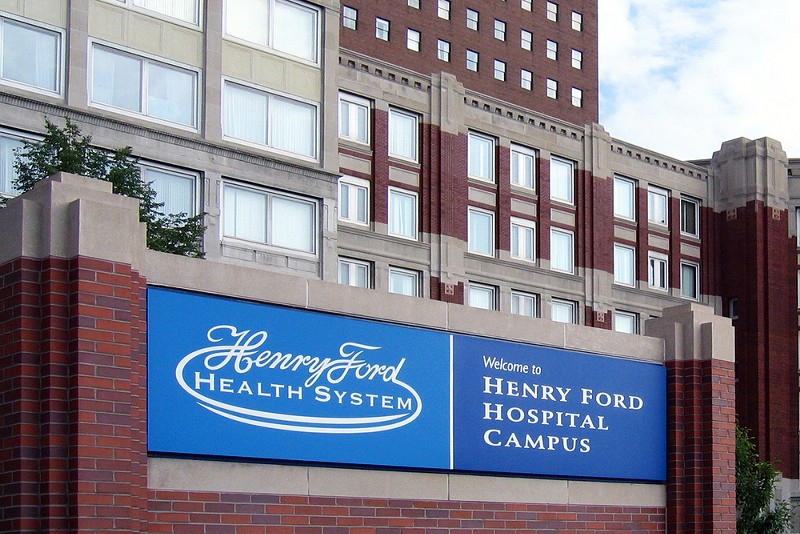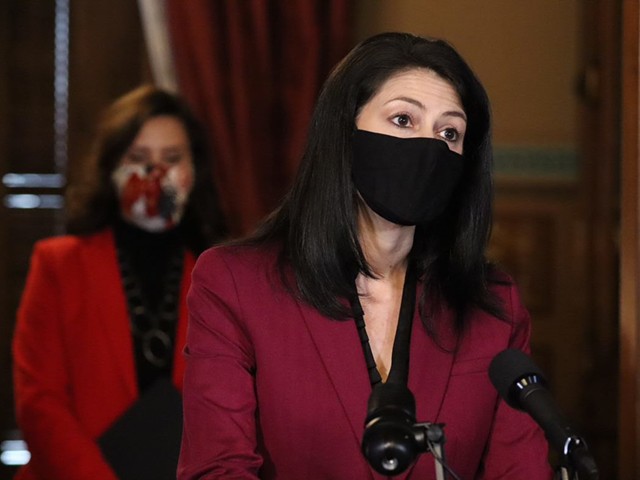Soaring COVID-19 hospitalization rates combined with the emergence of the omicron variant and the resurgence of the flu could force Michigan hospitals to further cut back on elective surgeries and other procedures during a second winter dominated by the pandemic, according to officials at the Detroit-based Henry Ford Health System.
“Our numbers of inpatients right now are putting us at capacity on an almost daily basis,” Bob Riney, Henry Ford Health System’s president of healthcare operations and chief operating officer, said during a Friday afternoon press conference. “If we continue to have more COVID inpatient hospitalizations…we would have to curtail elective procedures in a more advanced way.”
Already, the health system that operates five hospitals has had to postpone elective procedures because their facilities have been flooded with COVID-19 patients — the “vast majority” of whom are unvaccinated, Riney noted. There are now 420 COVID-19 hospitalizations inside the Henry Ford system and another 30 COVID patients waiting in the emergency department to be admitted, said Dr. Adnan Munkarah, executive vice president and chief clinical officer at Henry Ford. Those numbers represent a 20% increase since Nov. 22 and are almost at the levels Henry Ford was reporting one year ago — at this time last year, there were 499 COVID patients.
Riney added that the health system will only be able to continue offering all of its procedures “if we see a decline in the rapidly rising COVID admissions.”
For weeks, Michigan was battling the highest COVID-19 case numbers in the country; this week, the state reported the second highest number of cases and case rate in the nation, the state Department of Health and Human Services (DHHS) said Wednesday. Health experts have told the Advance that hospitals are at a “breaking point” as a fourth COVID-19 surge leaves health facilities to once again face soaring numbers of unvaccinated patients.
It’s the high unvaccinated rate in our community that’s allowing variants like delta and now omicron to be spreading and forming.
– Dr. Adnan Munkarah, executive vice president and chief clinical officer at Henry Ford Hospital
DHHS reported Friday that a total of 1,336,566 Michiganders have tested positive for COVID-19 and 24,367 have died from the virus — an additional 18,443 cases and 277 deaths since Wednesday. The state’s COVID-19 case rate has been increasing for the past month, the percent of hospital inpatient beds occupied by COVID-19 patients has continued to rise for the past 18 weeks, and the death rate has been climbing for one week, according to the DHHS.
Now, as millions of Michiganders remain unvaccinated, the omicron variant appears in the United States and is believed to spread twice as quickly as the delta variant, according to scientists in South Africa, where it was first detected. And as the flu reemerges after being largely dormant last year due to mask protocols and social distancing, this winter could prove to be even more daunting than last year, Henry Ford officials said. That’s not inevitable, but to change that course means more Michiganders will need to get vaccinated and their booster shots and continue to wear masks, Riney and Munkarah said.
About 4.18 million Michiganders are either not vaccinated at all or not fully vaccinated, according to the DHHS. Approximately 55.6% of Michiganders — 5.2 million people — are fully vaccinated, meaning they’ve had both doses of the Pfizer or Moderna vaccine or one shot of the Johnson & Johnson vaccine. Before the delta variant, health officials in the state and country set goals of vaccinating at least 70% of the population. That, however, has changed as more contagious variants spread around the globe. Dr. Matthew Sims, the director of infectious disease research at Beaumont Hospital, Royal Oak, told the Advance in November that 90% of the population needs to be vaccinated.
“It’s the high unvaccinated rate in our community that’s allowing variants like delta and now omicron to be spreading and forming,” Munkarah said.
Although the omicron variant appears to spread far more quickly than the already-fast spreading delta variant, Munkarah said it’s important to note there’s still much to learn about the new variant that has been identified across the globe, including in the United States. There are no identified omicron cases in Michigan, but Munkarah said it’s inevitable there will be.
“While we are concerned about omicron … it’s important we not panic,” Munkarah said. “We know variants are going to emerge. We know this is typical of these kinds of viruses, and we know ways to protect ourselves.”
“First and foremost, for those who have not been vaccinated, please get vaccinated,” Munkarah continued.”For those who have gotten the vaccine, get the booster. Please wear your mask in indoor settings and wash your hands frequently.”
While we are concerned about omicron … it’s important we not panic. We know variants are going to emerge. We know this is typical of these kinds of viruses, and we know ways to protect ourselves.
– Dr. Adnan Munkarah
It’s the fact that people are not choosing to protect themselves or others by not getting vaccinated that’s leaving already struggling health care workers to feel increasingly defeated, Riney said.
Riney noted that he recently visited a 21-bed intensive care unit at Henry Ford Macomb Hospital in Clinton Township — which has the health system’s highest number of COVID-19 patients — and spoke with a nurse who called the current surge “very disheartening.”
“She said, ‘We have a stellar team doing exceptional work, but I have 21 beds and 21 patients [who are] all COVID positive and very ill … and not a single one of those patients is vaccinated. It’s heartbreaking to tell my staff to please continue to give up your holidays, work six shifts in a row, stress yourself in ways beyond imagination when there’s the perception the community is not meeting us halfway in this fight,’” Riney said.
If Henry Ford continues to see increases in COVID-19 patients, it won’t just have to cut elective procedures — the health system may need to ask for additional support, such as from the federal government. The federal government recently approved requests from Gov. Gretchen Whitmer for staffing assistance at Covenant HealthCare in Saginaw; Beaumont Hospital, Dearborn; and Spectrum Health in Grand Rapids.
“We’re very close,” Riney said, referring to asking for help from the federal government. “… If these numbers continue to go up 10% or 20% every couple weeks the way we’re seeing it, we’ll be looking for alternative help quite quickly.”
Originally published December 6, 2021 on Michigan Advance. It is shared here with permission.Stay connected with Detroit Metro Times. Subscribe to our newsletters, and follow us on Google News, Apple News, Twitter, Facebook, Instagram, or Reddit.






